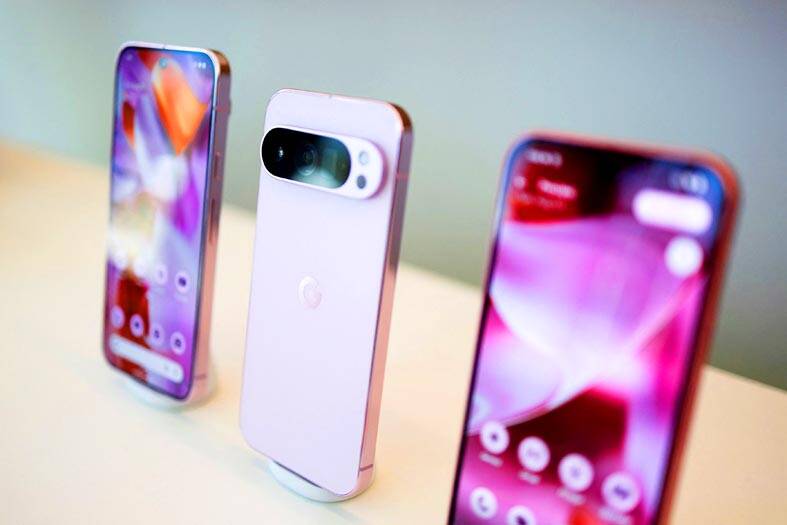Tech giant Google on Tuesday unveiled its new Pixel 9 smartphone series, which includes artificial intelligence (AI) technology, announcing that they would hit Taiwan shelves on Thursday next week.
The Pixel 9 series could help consumers better envision the potential of artificial intelligence, analysts said.
The phones are also expected to boost Google’s competitiveness against Apple Inc, which has teamed up with OpenAI to develop AI applications for iPhones, they said.

Photo: Reuters
The Pixel weaves users more tightly into Google’s online services, taking a page from Apple’s strategy with the iPhone and App Store.
The Pixel 9 models use Google’s Gemini AI capabilities, offering consumers an alternative to the iPhone’s Apple Intelligence AI.
The entry model Pixel 9 with a 6.3-inch Actua display, the more advanced 6.3-inch Pixel 9 Pro, and the 6.8-inch Pixel 9 Pro XL, would be available in Taiwan at starting prices of NT$26,490, NT$33,490 and NT$39,990, respectively, Google said.
The Pixel 9 Pro Fold — the second generation of Google’s foldable smartphone — is scheduled to go on sale in Taiwan on Sept. 4 with a starting price of NT$56,990, the company said.
Pixels account for a tiny sliver of the global smartphone market dominated by Samsung Electronics Co and Apple, but Google said that its new line is a chance to answer what — after all the hype — AI can actually do for customers.
“I understand people’s skepticism,” Google senior vice president of devices Rick Osterloh said at the company’s campus in Mountain View, California, on Tuesday.
“There have been so many promises, so many ‘coming soons,’ and not enough real-world helpfulness when it comes to AI — which is why today we’re getting real,” Osterloh said.
However AI-infused Pixels also raise questions about how well Google is safeguarding personal data and how regulators would react to the tech giant’s push to make users even more dependent on its platform.
A US judge last week handed Google a major legal blow, ruling in a landmark antitrust case that it has maintained a monopoly with its dominant search engine.
Google said it has prioritized privacy, from protecting data used by its AI to letting users create password-protected private spaces for apps and other content.
Pixel 9 models let Gemini AI handle personal requests, sending no sensitive information off the device, it said.

UNCERTAINTY: Innolux activated a stringent supply chain management mechanism, as it did during the COVID-19 pandemic, to ensure optimal inventory levels for customers Flat-panel display makers AUO Corp (友達) and Innolux Corp (群創) yesterday said that about 12 to 20 percent of their display business is at risk of potential US tariffs and that they would relocate production or shipment destinations to mitigate the levies’ effects. US tariffs would have a direct impact of US$200 million on AUO’s revenue, company chairman Paul Peng (彭雙浪) told reporters on the sidelines of the Touch Taiwan trade show in Taipei yesterday. That would make up about 12 percent of the company’s overall revenue. To cope with the tariff uncertainty, AUO plans to allocate its production to manufacturing facilities in

Taiwan will prioritize the development of silicon photonics by taking advantage of its strength in the semiconductor industry to build another shield to protect the local economy, National Development Council (NDC) Minister Paul Liu (劉鏡清) said yesterday. Speaking at a meeting of the legislature’s Economics Committee, Liu said Taiwan already has the artificial intelligence (AI) industry as a shield, after the semiconductor industry, to safeguard the country, and is looking at new unique fields to build more economic shields. While Taiwan will further strengthen its existing shields, over the longer term, the country is determined to focus on such potential segments as

TAKING STOCK: A Taiwanese cookware firm in Vietnam urged customers to assess inventory or place orders early so shipments can reach the US while tariffs are paused Taiwanese businesses in Vietnam are exploring alternatives after the White House imposed a 46 percent import duty on Vietnamese goods, following US President Donald Trump’s announcement of “reciprocal” tariffs on the US’ trading partners. Lo Shih-liang (羅世良), chairman of Brico Industry Co (裕茂工業), a Taiwanese company that manufactures cast iron cookware and stove components in Vietnam, said that more than 40 percent of his business was tied to the US market, describing the constant US policy shifts as an emotional roller coaster. “I work during the day and stay up all night watching the news. I’ve been following US news until 3am

COLLABORATION: Given Taiwan’s key position in global supply chains, the US firm is discussing strategies with local partners and clients to deal with global uncertainties Advanced Micro Devices Inc (AMD) yesterday said it is meeting with local ecosystem partners, including Taiwan Semiconductor Manufacturing Co (TSMC, 台積電), to discuss strategies, including long-term manufacturing, to navigate uncertainties such as US tariffs, as Taiwan occupies an important position in global supply chains. AMD chief executive officer Lisa Su (蘇姿丰) told reporters that Taiwan is an important part of the chip designer’s ecosystem and she is discussing with partners and customers in Taiwan to forge strong collaborations on different areas during this critical period. AMD has just become the first artificial-intelligence (AI) server chip customer of TSMC to utilize its advanced